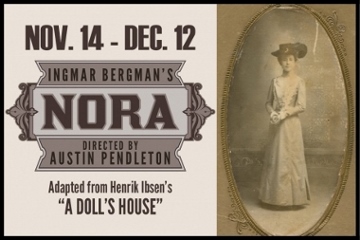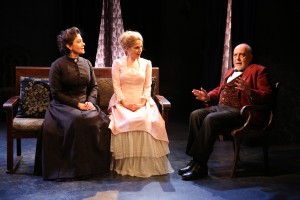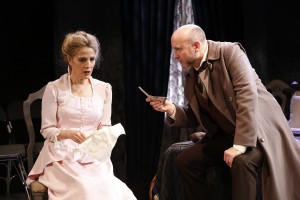NEITHER NORA
Nora, Ingmar Bergman’s adaptation of Henrik Ibsen’s A Doll’s House, centers on its titular character, a beautiful young wife and mother, whose cozy life at her husband’s bosom is threatened when she is blackmailed over an indiscretion she committed years earlier to save his life. The play, performed in New York City for the first time in English, from a solid translation by Frederick J. Marker and Lise Lone-Marker, concerns itself in part with themes of gender politics and a woman’s struggle in a male-dominated society. Yet once its socioeconomic scaffolding has served its purpose Nora transcends it, exploring questions more existential, personal and universal: What do we want? Do we in fact love the people we’re supposed to love—our children, our spouses—or are we putting on a performance for them? for ourselves? And those who love us, do they love us? Or do they love the people they imagine us to be? Do they know us? Do we know ourselves?
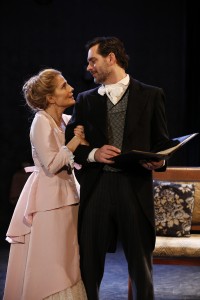 To see Nora staged is a treat, even in an imperfect production, such as the one currently at the Cherry Lane Theatre. Directed by Austin Pendleton, the show feels rough, like a sculpture still partially trapped in its stone—we can see generally what it’s supposed to look like and some elements are more finished than others, but much of the fine work necessary to bring vivid life to the thing, to draw the eye to the subtext, is unfinished.
To see Nora staged is a treat, even in an imperfect production, such as the one currently at the Cherry Lane Theatre. Directed by Austin Pendleton, the show feels rough, like a sculpture still partially trapped in its stone—we can see generally what it’s supposed to look like and some elements are more finished than others, but much of the fine work necessary to bring vivid life to the thing, to draw the eye to the subtext, is unfinished.
Performances feel incomplete. One isn’t compelled to believe that the actors are their characters. Yet one can choose to do so and not feel like a total fool. There are two exceptions: Larry Bull is excellent as Krogstad, the disgraced, scheming lawyer blackmailing Nora. And Todd Gearhart, who, in portraying Nora’s very proper husband Torvald, has a good grasp of his character’s manner but little else. The shallowness of his performance serves to undermine every scene he is in, and it would not be unreasonable to go so far as to attribute many of the production’s failings to this unfortunate dynamic.
Jean Lichty captures Nora’s combination of playfulness, innocence and earnestness; not as well worked out are the layers of complexity that make up her character’s interior world. George Morfogen is admirable as Torvald’s aged friend Dr. Rank, a man of gravity and dry wit whose imminent demise goes virtually unnoticed, no matter how many coy hints he drops. And Andrea Cirie rounds out the cast as Mrs. Linde, a widow and childhood friend of Nora’s, who married a man she didn’t love in order to provide for her sick mother and two little brothers.
Individual portrayals aside, the overall rhythm of the show feels choppy, the result of what appears to be a lack of cohesion between the different performances; they don’t quite click together. It’s difficult to know in an imperfect production what is intentional and what is not. It’s possible that this awkwardness is deliberate, designed to create a sense of disconnect between the characters, thus echoing themes in the play. But for this nuanced approach to succeed individual performances would need to be a lot more robust.
Nora boasts many good directorial ideas. Yet most of these are either incomplete or insufficiently realized. Harry Feiner’s period set of Nora and Torvald’s home is cramped, dark and a bit claustrophobic; presumably the intention is to mirror Nora’s inner state, and for most of the show this approach is conceptually sound. But towards the end of the play, in a moment of candid self-reflection, Nora describes herself as having lived in a “doll’s house” and having had “fun” in her marriage. This suggests that at some point cramped and claustrophobic was, for her, cozy and safe. Yet with the set fixed and Mr. Feiner’s lighting consistently muddy, we never get a true sense of this part of her life.
The show begins with Mrs. Linde and Krogstad showing up on stage, not as their real flesh-and-blood selves but as presences, symbols, harbingers of doom. They sit down on the couch and remain there for Nora and Torvald’s first interaction—an 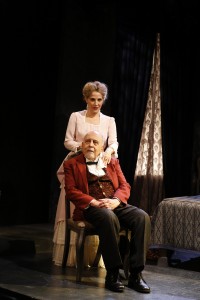 optimistic one in which Torvald informs his wife of his imminent promotion. We understand what the director is telling us with these uninvited spirits: the spouses are happy now but disaster awaits. Yet there is not enough contrast between the spaces the two couples occupy—something that could have been achieved, at least in part, with more expressive lighting—to make us feel the dread that we intellectually understand is supposed to be there.
optimistic one in which Torvald informs his wife of his imminent promotion. We understand what the director is telling us with these uninvited spirits: the spouses are happy now but disaster awaits. Yet there is not enough contrast between the spaces the two couples occupy—something that could have been achieved, at least in part, with more expressive lighting—to make us feel the dread that we intellectually understand is supposed to be there.
With numerous examples of similar problems Nora remains a watchable show, even quietly pleasant in its way. The sense one gets is not of incompetence but simply that the production didn’t have enough time to sufficiently develop this complex, multi-layered Swedish play. This leaves one hopeful that over the course of the run the show will improve, as shows with great scripts and talented, capable participants tend to do.
photos by Carol Rosegg
Nora
Cherry Lane Theatre with La Femme Theatre Productions
Cherry Lane Theatre, 38 Commerce St.
ends on December 12, 2015
for tickets, call 866.811.4111 or visit Cherry Lane
